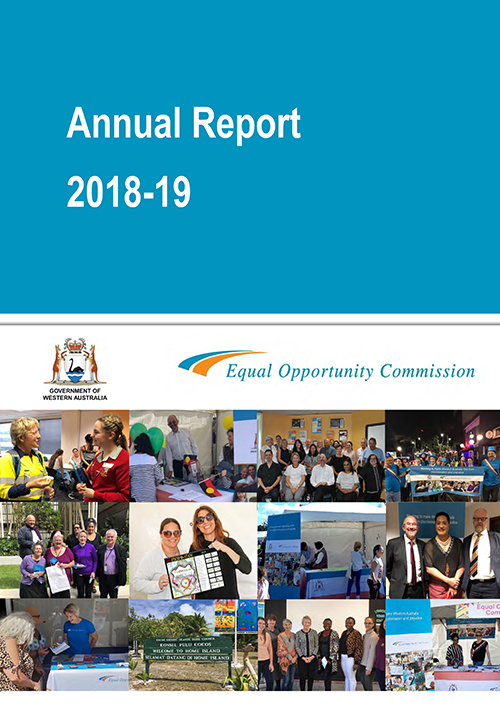From the Acting Commissioner (Foreword Annual Report 2018-19)
It gives me great pleasure to table the 2018-19 Annual Report of the Western Australian Equal Opportunity Commission (the Commission) for the period ending 30 June 2019, in accordance with section 95 of the Equal Opportunity Act 1984 (the Act). When the Act commenced there was an expectation it would contribute to educating the community about the benefits of treating people with respect and dignity as well as provide an accessible mechanism for investigating and resolving complaints of unlawful discrimination.
The WA Act with other Australian antidiscrimination legislation has contributed to some welcome changes in many areas of public life, such as reducing discrimination of people who are in employment and in access to goods and services for women, Aboriginal people, people with disability and older people. None the less, the Act may not be working as effectively as it could. For instance, in the area of employment, few complaints are lodged by job applicants since they often do not have the evidence required to substantiate their complaints.
Despite the low number of complaints from people seeking employment, older people, ethnic minorities and people with disability experience high rates of unemployment and underemployment and the organisations that represent and advocate for these groups express concern about the processes and practices used by employers to recruit staff. Many workplaces have lower diversity than the general community.
The Act is now over 35 years old and was created at a time when many hotels segregated Aboriginal people, sporting clubs prevented women members playing on weekends and people of the same sex were unable to marry. The Act has remained largely unchanged since 1984. It is now timely to review and modernise the Act. The Attorney General announced the State Government would initiate a review of the Act to be conducted by the WA Law Reform Commission. Equal Opportunity Commission | 2 | Annual Report 2018-19 This review is welcomed by the Commission and provides a timely opportunity to consult the community about enhancing the Act to bring it in line with Australian and international best practice regarding equal opportunity, anti-discrimination and human rights.
The Commission is an independent statutory body comprised of 20 hardworking staff. Its core functions are to prevent and redress unlawful discrimination, in accordance with the Act, across WA’s diverse and widely dispersed population. This Annual Report demonstrates the Commission continues to provide a high-quality service in its core business areas. There have been positive trends in both the area of community education and training, and in complaint handling. In complaint handling, there has been a moderate increase in the number of new complaints lodged, with 475 complaints received in the 2018-19 financial year. Community Education staff conducted 188 training and education sessions during the year, as well as working collaboratively with government and nongovernment agencies in developing and trialling customised training modules. I am very proud of the enthusiasm and commitment shown by Commission staff.
Evaluation demonstrated exceptionally high rates of satisfaction and professionalism in the services we provided in the complaints conciliation process and in our community education and outreach. Throughout 2018-19 the Commission continued to strengthen its community presence through rebranding its information products and by attending events to recognise Harmony Week, NAIDOC week and Pride Month. It also continued to organise events to celebrate International Women’s Day, Human Rights Day and International Day of People with Disability.
The Commission progressed its annual community projects such as the Aboriginal Calendar and artwork competition, the Isabelle Lake Memorial Lecture, as well as chairing the New and Emerging Communities Reference Group. In 2018-19 the Commission also undertook a research project into discrimination against people aged over 55 and produced a report entitled Age is not a use by date. The Commission is an active member of the Australian Council of Human Rights Authorities (ACHRA) which provides a national voice for promoting a range of issues relating to vulnerable groups in a world increasingly impacted by inequity. In the 2018-19 financial year ACHRA placed a focus on race issues and ways of addressing unconscious bias, especially in the area of employment.



